|
|
|
Sort Order |
|
|
|
Items / Page
|
|
|
|
|
|
|
| Srl | Item |
| 1 |
ID:
176213
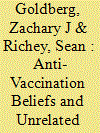

|
|
|
|
|
| Summary/Abstract |
Much recent literature has examined the correlates of anti-vaccination beliefs, without specifying the mechanism that creates adherence to these debunked ideas. We posit that anti-vaccination beliefs are an outcome of a general psychological propensity to believe in conspiracies based on new research on the interconnectedness of conspiracy beliefs. These ideas are tested with a confirmatory factor analysis and a seemingly unrelated regression (SUR) model of a nationally representative U.S. sample from the 2016 American National Election Studies. The confirmatory factor analysis shows that anti-vaccination beliefs highly correlate with belief in the unrelated conspiracies that Obama is a Muslim and 9/11 trutherism. Our SUR models also show that all three of these very different beliefs have similar predictors. All three have a negative correlation with political trust, political knowledge, education, and a positive correlation with authoritarianism. Thus, anti-vaccination beliefs are shown to be part of a psychological propensity to believe in conspiracies
|
|
|
|
|
|
|
|
|
|
|
|
|
|
|
|
| 2 |
ID:
171664
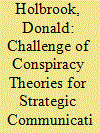

|
|
|
|
|
| Summary/Abstract |
Donald Holbrook highlights the role conspiracy theories play in relation to state and non-state strategic communications efforts that are hostile to Western security interests. Not only is their use and acceptance prevalent, but conspiracy theories also represent powerful rhetorical tools to justify indiscriminate or mass-scale aggression since they link shared grievances with alleged and purported networks of perpetrators, whose intent, secrecy, agency and connectedness are taken for granted.
|
|
|
|
|
|
|
|
|
|
|
|
|
|
|
|
| 3 |
ID:
193261
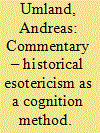

|
|
|
|
|
| Summary/Abstract |
A number of para-academic tendencies in Russian social science helped prepare the Ukraine war. In addition to propaganda and disinformation campaigns by the Kremlin, an intellectual deformation of the Russian elite by the Manichean ideas of such theorists as Lev Gumilyov and Aleksandr Dugin is partly responsible for Russia's increasing secession from Europe. Post-Soviet public discourse has become infected with an array of speculative, often conspiratorial, and sometimes occultist or racist theories. Their proponents have crowded out acknowledged social scientists and historians from intellectual and media debates. This parallel public discourse has been developing since the beginning of glasnost, 35 years ago, and became one of the determinants of Russia's attack on Ukraine in 2014.
|
|
|
|
|
|
|
|
|
|
|
|
|
|
|
|
| 4 |
ID:
118650
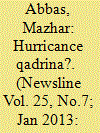

|
|
|
| 5 |
ID:
190045
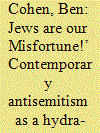

|
|
|
|
|
| Summary/Abstract |
Antisemitism has once again proven itself to be an international phenomenon, crossing borders and cultures with ease and adept at finding major issues in the public square, such as the COVID-19 pandemic, upon which to hang its claims. This article argues that antisemitism currently takes four major forms: Anti-Zionist antisemitism, which targets the State of Israel as a Jewish collectivity; Neo-Traditionalism, which revives pre-modern anti-Judaic notions in contemporary guise; Holocaust relativisation, which involves instrumentalizing and distorting the nature of the Holocaust without denying it outright; and anti-Judaism, which manifests in efforts to ban circumcision, kosher slaughter and other core Jewish rituals. The article concludes by examining whether the International Holocaust Remembrance Alliance (IHRA) Working Definition of Antisemitism is an adequate tool for engaging with a growing problem, suggesting ways in which the definition might be amended to make it more effective.
|
|
|
|
|
|
|
|
|
|
|
|
|
|
|
|
| 6 |
ID:
173402
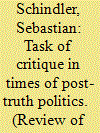

|
|
|
|
|
| Summary/Abstract |
Post-truth politics poses a specific problem for critical theories. The problem is that the relativisation of facts – the claim that knowledge is merely a product of power, history, and perspective – is a core aspect of present-day ideological thinking. Critical theories have been unable to respond to this challenge, because their critique has been directed against the opposite claim, namely the naturalisation of facts. While acknowledging this problem, this article argues that post-truth discourse actually combines relativisation and naturalisation. It does not simply relativise truth, but also naturalises the belief in specific ‘facts’ – notably the belief that ‘conspiracies are behind it all’. Once we recognise the twin character of post-truth, we must reject the view of Bruno Latour and others who have made critique responsible for the crisis. Instead, it then becomes apparent that there are deep and disconcerting similarities between post-truth politics and the totalitarian and authoritarian ideologies of the twentieth century. The task of critique is to confront and counter this resurgent ideology, thereby providing direction and orientation in the struggle for emancipation.
|
|
|
|
|
|
|
|
|
|
|
|
|
|
|
|
| 7 |
ID:
188103


|
|
|
|
|
| Summary/Abstract |
This project examined conspiracy theory use across three types of groups: radical violent extremists (RVE), nonviolent extremists, and moderates. Using the theory of significance quest, or the desire for one’s life to have meaning, the current project determined whether RVE groups were more likely to use conspiracy theories and promote loss of significance in violent passages than the other groups. Using text analysis software, researchers coded passages from six groups—two from each level of extremism—for conspiratorial and/or violent content. RVE groups were significantly more likely than the other groups to use conspiracy theories and promote violence. This pattern held for groups focused on radical Islamic fundamentalism as well as white supremacy groups. The pattern was more complex for loss of significance: in violent passages, neo-Nazis were significantly more likely than ISIS and Al Qaeda to promote loss of significance. Implications of the findings are discussed.
|
|
|
|
|
|
|
|
|
|
|
|
|
|
|
|
|
|
|
|
|